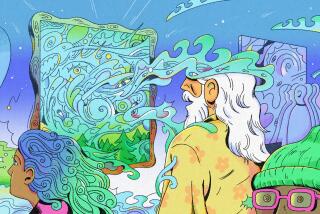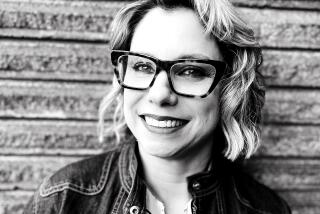Allen Cohen, 64; Poet and Sage of Counterculture Era
- Share via
Allen Cohen, a poet and the founding editor of the San Francisco Oracle, an underground newspaper that featured psychedelic art, poetry and interviews with leaders of the 1960s counterculture, has died. He was 64.
Cohen suffered from liver cancer, according to Ann Cohen, his former wife. The couple divorced several years ago but had reconciled. He died April 29 at their home in Walnut Creek.
Born in New York City, Cohen came to California in 1962 after discovering the Beat poets of the ‘50s as a student at Brooklyn College. He settled in the North Beach area of San Francisco and moved to Haight-Ashbury in time to see it blossom into the West Coast hub of hippie culture.
He worked in the Psychedelic Shop in his neighborhood but dreamed of publishing a rainbow-colored newspaper filled with poetry and art. In September 1966, he and several friends launched the Oracle. Cohen described it as “the Haight-Ashbury newspaper of record,” a handout with a distinctive splash of bright colors.
Publication was sporadic. There were four issues in 1966, seven in 1967 and one in 1968, its final year. Cohen gave the Oracle a sophisticated edge by including pieces by his friends: poets Allen Ginsberg and Gary Snyder, novelist Ken Kesey, LSD guru Timothy Leary, visionary architect Buckminster Fuller and others.
Each issue looked into hippie culture -- the Aquarian age, flower power and “the youth quake,” among other themes. One issue covered the first “Human Be-In,” held in January 1967. It became a legend of the era after more than 20,000 people gathered at Golden Gate Park to hear Ginsberg and Snyder read their poems and meet Leary, the event’s grand marshal.
Later that year, Cohen urged young people to come to San Francisco for the “Summer of Love.” The invitation stirred teenagers across the country to flock to the city. A popular song, “San Francisco (Be Sure to Wear Some Flowers in Your Hair),” sung by Scott McKenzie, helped get the word out when it climbed the charts.
“Allen represented the energy behind the hippie movement,” said John Byran, who was editor of the alternative paper Los Angeles Free Press in the mid-’60s. “He was extremely creative, a good poet, and he knew a lot of people. The Oracle was his moment.”
The Oracle closed in 1968, and Cohen moved to a commune near Mendocino, Calif., living in a tepee. He helped with the birth of his son, River, and was so moved by the experience that he wrote a collection of poems, “Childbirth Is Ecstasy,” published in 1970.
Back in San Francisco in the early ‘70s, Cohen continued to write poetry and was active in the antiwar movement of the Vietnam era. His second collection of poems, which took a critical look at the politics of Ronald Reagan, was published in 1980.
Times changed, but Cohen clung to the ‘60s counterculture. He compiled editions of the Oracle into a book. To cover the cost of its publication in 1991, he held slide shows and lectures about the Haight in the old days.
Through the 1990s, Cohen worked as a substitute teacher in Oakland and continued to give poetry readings at coffeehouses and bookstores.
After the Sept. 11, 2001, terrorist attacks, he and Clive Matson co-edited an anthology, “An Eye for an Eye Makes the Whole World Blind.” The book includes poems by Robert Pinsky, Lawrence Ferlinghetti, Diane Di Prima and nearly 100 others. It won the PEN Oakland National Literary Award in 2003.
Cohen wrote “The Fallen Tower” for the anthology, a poem that reads like a chant from the Summer of Love:
We are the leaders.
We who imagine a shared
humanity.
We who care about our
endangered future.
He saw 9/11 as the start of a new peace movement, “a new crusade of reconciliation between nations.”
Cohen is survived by his former wife and his son.
More to Read
Sign up for our Book Club newsletter
Get the latest news, events and more from the Los Angeles Times Book Club, and help us get L.A. reading and talking.
You may occasionally receive promotional content from the Los Angeles Times.







